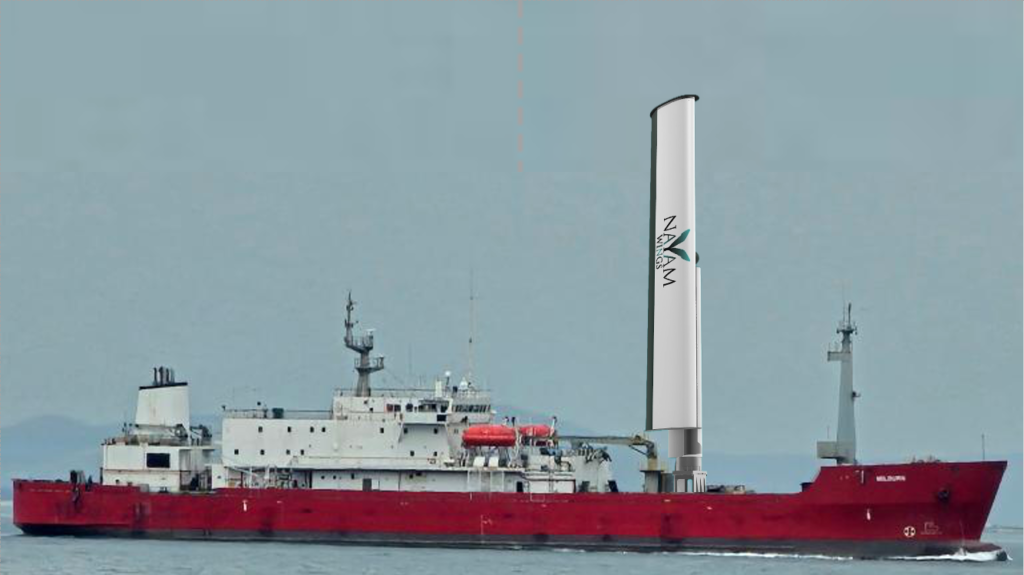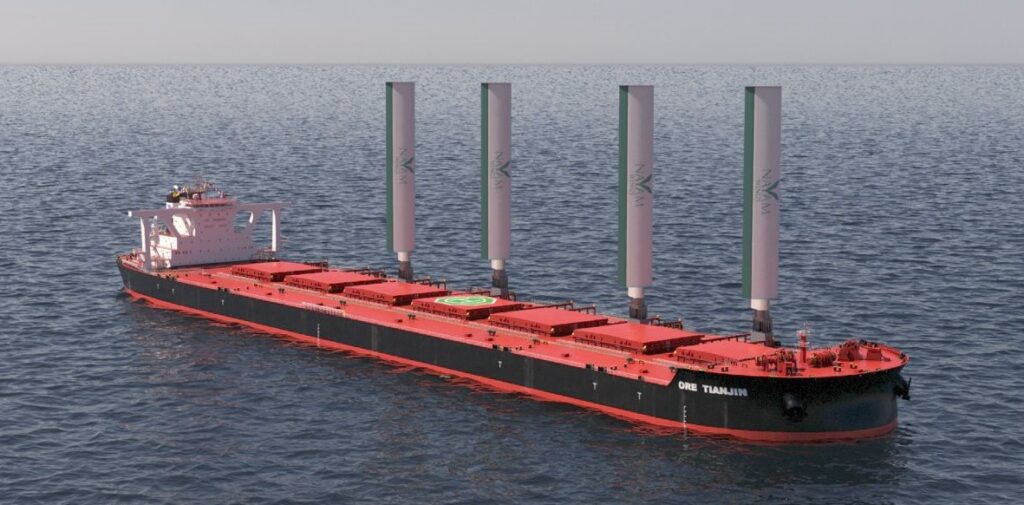Israeli startup Nayam Wings has taken airplane wings and refitted them as sails for merchant shipping, and in doing so believes it can reduce fuel usage by an average of up to 35 percent per voyage, cutting down on costs and – crucially – pollution.
For an industry that is traditionally slow to evolve, says Nayam Wings CEO and co-founder Saar Carmeli, regulatory changes to reduce pollution of the past decade have been daunting.
Almost all water-bound vessels are today solely powered by electric motors or combustion engines, and Carmeli, a captain in the Israeli Navy reserves, says this situation has to change.
But, he says, while many industries have begun to move towards renewable, clean energy such as solar, the maritime world has more or less remained constant.
“The maritime industry is very conservative,” Carmeli tells NoCamels. “In general, it hasn’t changed for 200 years, since the Industrial Revolution. Man discovered the combustion engine, started using it, and never stopped till this day.”

In recent years, however, there has been a growing understanding of the dangers of ship emissions and the sicknesses they can cause, in particular along coastlines.
The issue was raised at the United Nations climate change conference in France in 2015, which led to the 2016 Paris Agreement on climate change.
“Shipping companies need to comply with these regulations, and they actually don’t know what to do,” Carmeli says.
Cleaner fuels are the future, he explains, but they are very expensive. Which is where Nayam Wings sails into view.
The startup’s unique propulsion system uses rigid, asymmetric wings as sails, based on the principles of aviation to maximize aerodynamics for the ship using them, a concept that Carmeli says bypassed the maritime industry.
“The shipping industry never met the Wright brothers’ development,” he says, referring to the pioneers of aviation who built and flew the first ever airplane in 1903. “So aerodynamics didn’t reach ships.”
Several companies have already incorporated the principles of aviation aerodynamics into their development of new propulsion for ships, using rigid wings as sails.
“It’s a new breed of sails based on aircraft technology,” Carmeli says. “They did a great job of converting the market and educating the market.”
But Nayam Wings “took it a step further” – basing their design on the actual wings from an airplane and adjusting it to meet the needs of a ship.
Sign up for our free weekly newsletter
SubscribeAnd unlike other companies developing rigid wings that use symmetrical elements, Carmeli explains that their wings are asymmetrical, just like airplane wings, in order to reduce drag, maximize the propulsion provided by wind power and to cope with different wind speeds. The system uses AI and advanced algorithms to determine which way the wind is blowing and adjusts the wings accordingly.
The wings are designed to reduce the amount of fuel and not impact on the speed of the ship, says Avishay Parker, Nayam Wing’s co-founder and COO and an Israeli Navy reserves commander.
“The ship will not change its speed, because the time to market for the maritime industry is extremely important,” Parker tells NoCamels.
“It’s a hybrid propulsion,” he explains. “The engine is working, but it needs less effort to bring the ship to the same speed. The wind is producing an amount of power, and the engine and the speed stay the same.”

The wings are designed for use on bulk carriers or bulker tankers – merchant ships that carry unpackaged cargo such as oil, grain or cement in their holds – as opposed to container ships that can also carry containers on their decks. And most merchant ships, explains Parker, are bulkers and tankers.
The idea of using the wings to incorporate wind power into ship propulsion in order to reduce fuel consumption came from the company’s third co-founder and its chairman and CTO Amnon Asscher, whom Parker describes as an extremely experienced aeronautical engineer and sailor.
The company actually takes its name from an amalgamation of his children’s names – Yanai and Maayan.
Carmeli says the company tested two proof of concept models themselves, and then again with Israel Aerospace Industries, the major state-owned manufacturer with which Nayam Wings has an ongoing collaboration.
“The results were magnificent,” he says, which allowed the company to predict that their inclusion on a ship can lead to a 15-25 percent fuel reduction for retrofitted installations and a 35 percent reduction for new-build ships.

For now, the company is raising the $3.5 million it needs to build the first full-scale prototype and believes that funding round will be completed by the end of the year.
It is also part of the startup ecosystem at the Israeli National Center of Blue Economy and Innovation, an organization focused on innovative marine technologies. The company will also appear at the Center’s conference in Haifa next month.
The patent for the technology is currently registered in Europe and the company has already signed a Letter of Intent (LoI) with leading shipping agency Dynamic Shipping, which is based in Haifa and has a cement carrier that Parker says is suitable for installing the Nayam Wings prototype due to a special base that it has on deck.
“They understand this is the future of the shipping market,” says Parker. “They understand that a hybrid solution can save a lot of money because of the fuel reduction.”
Related posts

Resilient And Nutritious New Plant-Based Milk Aims To Make A Splash

Chocolate From Cultivated Cocoa Comes Without Environmental Toll

Plastic Fantastic: Startup Takes PVC Back To Its Crude Oil Roots




Facebook comments